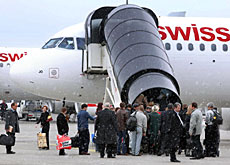Armed guards “normal” on Swiss planes

As other countries consider whether to deploy armed “sky marshals” on certain flights, Switzerland has revealed that it has used them for over 30 years.
Last month, the United States announced that it would in future require armed guards to be present on selected flights to, from, and over the US.
Switzerland introduced sky marshals following the hijacking of a Swissair plane in 1970.
It was en route from Zurich to New York, but was hijacked to Jordan by Palestinian terrorists, who later blew up the plane after releasing all the passengers and crew unharmed.
The US insistence on sky marshals has met with opposition from some European countries.
Denmark and Sweden have already ruled out armed guards on their planes, while Portugal’s civil aviation authority has said putting loaded guns on board an aircraft could endanger it.
In Britain, both pilots and British Airways have expressed grave reservations about government proposals to put sky marshals on certain flights.
Extra security
Swiss pilots and the national carrier, Swiss, support the presence of armed guards on certain flights, and believe their colleagues in other European countries have nothing to fear from introducing similar measures themselves.
Christian Frauenfelder, vice-president of the Swiss pilots union Aeropers, says he and his colleagues see the armed guards simply as an extra security measure.
“I don’t really know why other pilots are opposed,” Frauenfelder told swissinfo. “We have had a good experience with our sky marshals, for us it’s normal to have them on board.”
A spokesman for Swiss, Jean-Claude Donzel, agrees that armed guards are a fact of life on many Swiss planes, and doesn’t believe it’s anything to worry about.
“We have been doing this for over 30 years now,” he told swissinfo. “We have well trained people, and we’ve never had a problem, so we don’t share these concerns of other countries.”
“On some of our flights armed guards are routine,” Donzel explained. “On others we can just introduce them depending on the international situation.”
“It would certainly be no problem for us if the US required us to put a security agent on board some flights.”
“Invisible” presence
Switzerland’s sky marshals are drawn from the cantonal police, but overall authority for them is in the hands of the Swiss Federal Office of Police.
It’s believed the sky marshals work on a rotational basis, so that they do not become regular travellers on certain flights.
But their identities and exact details of their training are confidential, for security reasons.
“We as a crew always know when there is a sky marshal on board,” said Frauenfelder. “We know what his name is, and what he looks like.”
“But for the passengers he is invisible.”
No shots fired
In over 30 years, Switzerland’s sky marshals have never had to fire their guns.
Frauenfelder sees this as a sign of just how successful the marshals are as a security measure.
“It’s a good sign if you have them and you don’t need them,” he explained. “The best security is prevention, if you have to use the guard that means one link in the security chain has been broken.
“If terrorists know you have tight security measures on board, it probably prevents them doing something to your aircraft.
“For me it was no surprise that the September 11 terrorists chose American aeroplanes and American airports, because there the security measures were very loose.”
Switzerland first introduced armed guards on some flights in 1970, following the hijacking of a Swissair flight.
Armed guards are now normal procedure on some flights, and can be introduced at short notice on others, depending on the international security situation.
Israel’s El Al and Sri Lankan Airlines are the two other carriers known to use armed guards on board their aircraft.
Denmark and Sweden have rejected US requests to put armed guards on some transatlantic flights.

In compliance with the JTI standards
More: SWI swissinfo.ch certified by the Journalism Trust Initiative










You can find an overview of ongoing debates with our journalists here . Please join us!
If you want to start a conversation about a topic raised in this article or want to report factual errors, email us at english@swissinfo.ch.